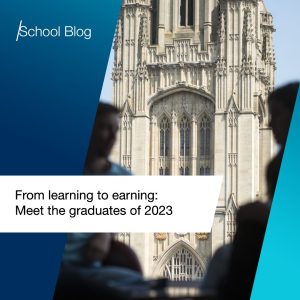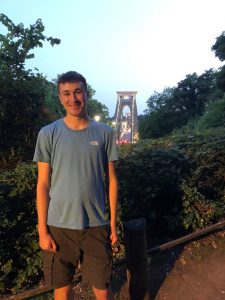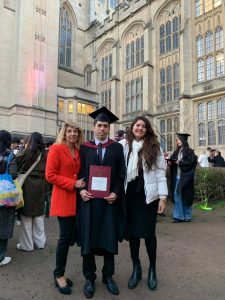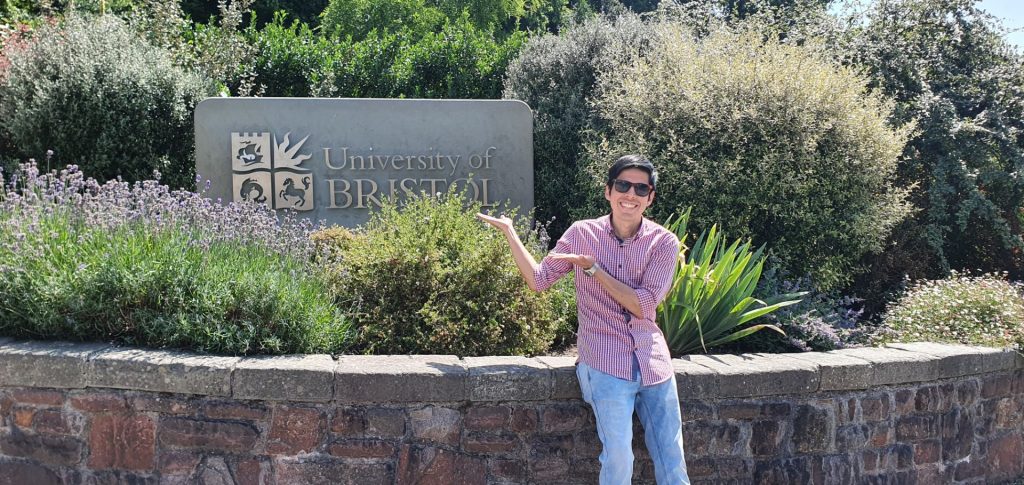 Simon and Victor both graduated their MSc Economics programme earlier this year, and have gone on to work for the Office for National Statistics and Hargreaves Lansdown, respectively. Here’s how studying economics at Bristol put them on the path to success.
Simon and Victor both graduated their MSc Economics programme earlier this year, and have gone on to work for the Office for National Statistics and Hargreaves Lansdown, respectively. Here’s how studying economics at Bristol put them on the path to success.
By Ffion Lindsay
Did you always know you wanted to study economics?
Simon: It wasn’t so much being set on becoming an economist – it’s just what seemed most interesting to me at the time. My thought process was that economics has a bit of everything and you can apply it to anything, really. Any problem you can think of.
Victor: Before, I worked in commercial companies and I was involved in education as a teaching assistant in Peru. But studying economics was something that I always wanted to do and I never had the opportunity. So now I’m happy because I’ve learned how that world operates.
Why did you choose your course at the University of Bristol?

Simon: I knew Bristol had a well-known uni. So it was a combination of word of mouth and seeing how well it did in the league tables.
I thought the Master’s programme had a good focus on the data science and econometrics side of things, and that is what I was more interested in.
Victor: First, I checked the QS World University Rankings and filtered for the top 100 universities in the world. I also looked into the employability ratio and it was higher than 90%.
Bristol is well-known for economics and I went through the program itself, looking at the modules and professors. In Peru it’s very different, because the universities give you the courses that you have to take – here you get to choose. So that was very appealing to me.
I also looked at the cultural events in Bristol, and it seemed like a good city to live in. Peru is very far away so I had to be sure of where I was going!
Have you had support from the university and opportunities to connect with industry?
Victor: Yes, I attended many employability webinars and they were very helpful. After that, you have the chance to go to the Careers Service if you had a particular query, but for me the webinars were enough. I also attended talks with industry leaders, and it was one of the most important parts of my studies.
I met a lot of people through that – making connections and meeting new people was often more valuable than the talk.
Simon: Talking to your lecturers is easy and I didn’t have any problems. I thought it was a very well-supported programme.
What was the highlight of your student experience at Bristol?
Victor: Getting my distinction. It was very tough to study here as I had never been so far away from my family for such a long time. So for me, getting that distinction was a big achievement. Graduation Day was really nice too – my mom and my sister came to the UK so it was really special. I showed them the city and it was a really nice day.
Simon: Academically, I quite enjoyed doing my dissertation. Just doing my own independent piece of work. It was on how important personality variables are in predicting income – factors like conscientiousness, extroversion, mental stability and that kind of thing. It was really interesting.
How did you find Bristol as a city?

Simon: It’s a cool city. I had a lot of good nights out. And it’s got the parks, the Downs, the suspension bridge. I’m from London and it’s more like London than I thought it would be. It just felt like a smaller version, you know?
Victor: I would choose it again because people are very friendly here. You have everything very close, and the weather is nice. Sometimes it’s a bit cold, but it’s not that bad like other cities can be. Bristol feels special – I’ve visited other cities like Manchester and London but I still choose to live here.
How did you find your current role?
Simon: One of my friends told me I should apply to the Government Economic Service (GES). It was easy to apply, and once I passed I was assigned to the Office of National Statistics. All I had to do was complete one interview, which was four hours long. I quite enjoyed it to be honest!
I found out I’d got the job while I was still doing my dissertation, but I didn’t start until this January because I wanted to take some time off.
Victor: I applied for the role at (financial service company) Hargreaves Lansdown and so far it’s really interesting. I am always learning something new and meeting new people each week. So far it’s helped me a lot with my personal and professional development.
My managers are very good people and they’re happy to help me and give me recommendations to improve. So I feel very lucky to be here.
What are your hopes for the future?
Simon: I am enjoying being an economist so far. I would definitely consider moving around within the GES in the future, but I’m only a couple of months in, so we’ll see!
Victor: I would like to stay in this company and progress my career, gradually gaining more responsibilities and leading a team at some point.
Five years ago, I never would have thought I’d be here – working in another country, another culture, speaking English. This is a dream come true for me.
Any advice for a future economics student?
Victor: If they are about to be far from family, as in my case, I would say – just keep going. Keep focusing on your studies and every day remember why you are here. If you want to be successful, you have to make the effort.
At the end of the day, you will have the gift of being graduated from a good university and have very good options in the work market.
Simon: Just go for it, really! I thought it would be really difficult to study a Master’s but it wasn’t as hard as I thought. And it’s definitely worth it.


